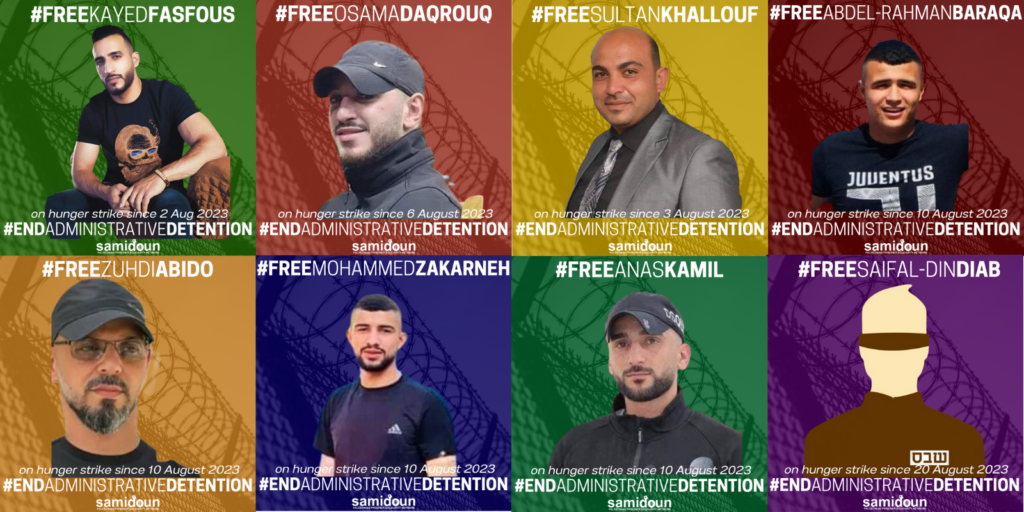
There are currently 8 Palestinian prisoners on hunger strike against administrative detention, and 2 more on hunger strike to address abusive conditions of detention. These hunger strikes are coming amid ongoing tensions and struggles within the prisons, especially after multiple raids and forcible transfers by Israeli occupation forces.
On Friday, 18 August, the Higher Emergency Committee of the Palestinian Prisoners’ Movement announced that 1,000 prisoners who had gone on hunger strike in protest against these actions had suspended their strike after winning concessions from the occupation prison authority, but the prisoners’ movement was continuing its actions to demand justice and liberation. The Palestinian prisoners on strike against administrative detention — imprisonment without charge or trial — have continued their actions.
Currently, Kayed Fasfous and Sultan Khallouf have been on hunger strike since 3 August 2023, Osama Daqrouq since 6 August, and Abdel-Rahman Baraqa, Mohammed Zakarneh, Anas Kamil and Zuhdi Abido have been on strike since 10 August. Reports indicate that Seif al-Din Diab, from the village of Beit Awwa, launched an open ended hunger strike today, 20 August, joining his fellow strikers. On the other hand, Hadi Nazzal and Mohammed Ikhmeis suspended their hunger strikes today, 20 August, after agreements to end their administrative detention.
The occupation prison administration today ordered Sultan Khallouf, 42, from the town of Burqin near Jenin, on his 18th day of hunger strike, to four months in administrative detention. Khallouf launched his hunger strike immediately upon his arrest on 3 August; he previously won his freedom from administrative detention in 2019 in a 67-day hunger strike. He is being held in Megiddo prison in isolation, alongside his fellow hunger strikers who are also isolated. The use of isolation against the hunger strikers is a tactic used by the occupation to attempt to coerce them to end their strikes.
Like Khallouf, Fasfous is also a former long-term hunger striker who previously won his freedom from administrative detention. Fasfous, 34, has been detained since 2 May 2023. Fasfous, whose four brothers are also imprisoned under administrative detention, has spent 7 years in the occupation prisons in total, 4 of them in administrative detention, after he was first detained in 2007. He is held in the Naqab desert prison. In late May and the beginning of June, he went on hunger strike for 9 days, which he ended with a promise to set a limit for his detention. In 2021, Kayed Fasfous conducted a 131-day hunger strike; images of his emaciated body were widely circulated, in sharp contrast to his commitment to fitness and bodybuilding while free. Fasfous is married and a father of a daughter, Joanne. He has been denied family visits since his arrest in May.
There are also two more Palestinian prisoners on hunger strike against arbitrary and abusive prison conditions; they have been on strike for one week: Islam Bani Shamsa, against his transfer to Ramon prison, and Hatem al-Qawasmeh, to demand to see his fellow imprisoned brother, Hazem.


On Saturday, 19 August, a group of Palestinian prisoners continued to protest the attacks on Palestinian leaders, including imprisoned PFLP leader Wael Jaghoub, who has been held in isolation since 31 July, when he and several fellow leaders were seized from their room and taken to interrogation by occupation forces.
What Is Administrative Detention?
Administrative detention was first used in Palestine by the British colonial mandate and then adopted by the Zionist regime; it is now used routinely to target Palestinians, especially community leaders, activists, and influential people in their towns, camps and villages.
There are currently approximately 1200 Palestinians jailed without charge or trial under administrative detention, out of nearly 5,000 Palestinian political prisoners, the highest number in 20 years.
Administrative detention orders are issued by the military and approved by military courts on the basis of “secret evidence”, denied to both Palestinian detainees and their attorneys. Issued for up to six months at a time, they are indefinitely renewable, and Palestinians — including minor children — can spend years jailed without charge or trial under administrative detention. Hundreds of Palestinians have gone on hunger strike to win their liberation from this form of arbitrary detention, which is not only illegal under international law but a form of psychological torture and collective punishment targeting Palestinian families and communities, as detainees are unable to predict or plan for their release.
Samidoun Palestinian Prisoner Solidarity Network urges all supporters of Palestine to take action to support these Palestinian hunger strikers and all Palestinian prisoners struggling for freedom, for their own lives and for the Palestinian people. These sons of the Palestinian popular masses are confronting the system of Israeli oppression on the front lines behind bars, with their bodies and their lives, to bring the system of administrative detention to an end. With over 1100 Palestinians jailed without charge or trial — over 20% of all Palestinian prisoners — the struggle to bring down administrative detention is more urgent than ever. Take these actions below to stand with the hunger strikers and the struggle for liberation of Palestine, from the river to the sea!
Download these signs for use in your campaigns:
- Poster/Sign: End Administrative Detention
- Poster/Sign: Free Hunger Strikers and All Prisoners
- Poster/Sign – End Administrative Detention (with Palestinian Flag)

TAKE ACTION:
Protest at the Israeli Embassy or Consulate in Your Country!
Join the many protests taking place around the world — confront, isolate and besiege the Israeli embassy or consulate in your city or country of residence. Make it clear that the people are with Palestine! Send us your events at samidoun@samidoun.net.
Take to the streets: Organize a protest in solidarity with Palestine!
Take to the streets and join actions for justice! Organize your own if there is none in your area, and send us your events at samidoun@samidoun.net.
Boycott Israel!
The international, Arab and Palestinian campaign to boycott Israel can play an important role at this critical time. Local boycott groups can protest and label Israeli produce and groceries, while many complicit corporations – including HP, G4S, Puma, Teva and others, profit from their role in support Zionist colonialism throughout occupied Palestine. By participating in the boycott of Israel, you can directly help to throw a wrench in the economy of settler colonialism.
Demand Your Government Sanction Israel!
The racist, settler colonial state of Israel and its war crimes against the Palestinian people are enabled and backed extensively by the over $3.8 billion each year given to Israel by the United States — targeted directly to support the Israeli occupation military killing children, women, men and elders throughout occupied Palestine. From Canada to Australia to the European Union, Western governments and imperialist powers provide ongoing diplomatic, political and economic support to Israel as well as selling billions of dollars of weaponry to the settler-colonial state. Meanwhile, they also purchase billions of dollars in weaponry from the Israeli state. Governments in league with imperialist powers, such as in the Philippines, Brazil, India and elsewhere, also buy weapons and “security” services — all “battle-tested” on the Palestinian population. Call your representatives, MPs, political officials and demand your government sanction Israel now, cut off all aid, expel its ambassadors, and stop buying and selling weapons!
Discover more from Samidoun: Palestinian Prisoner Solidarity Network
Subscribe to get the latest posts sent to your email.




